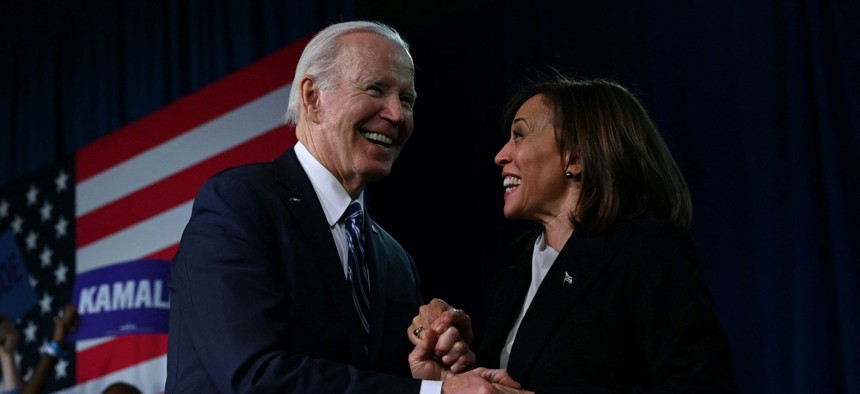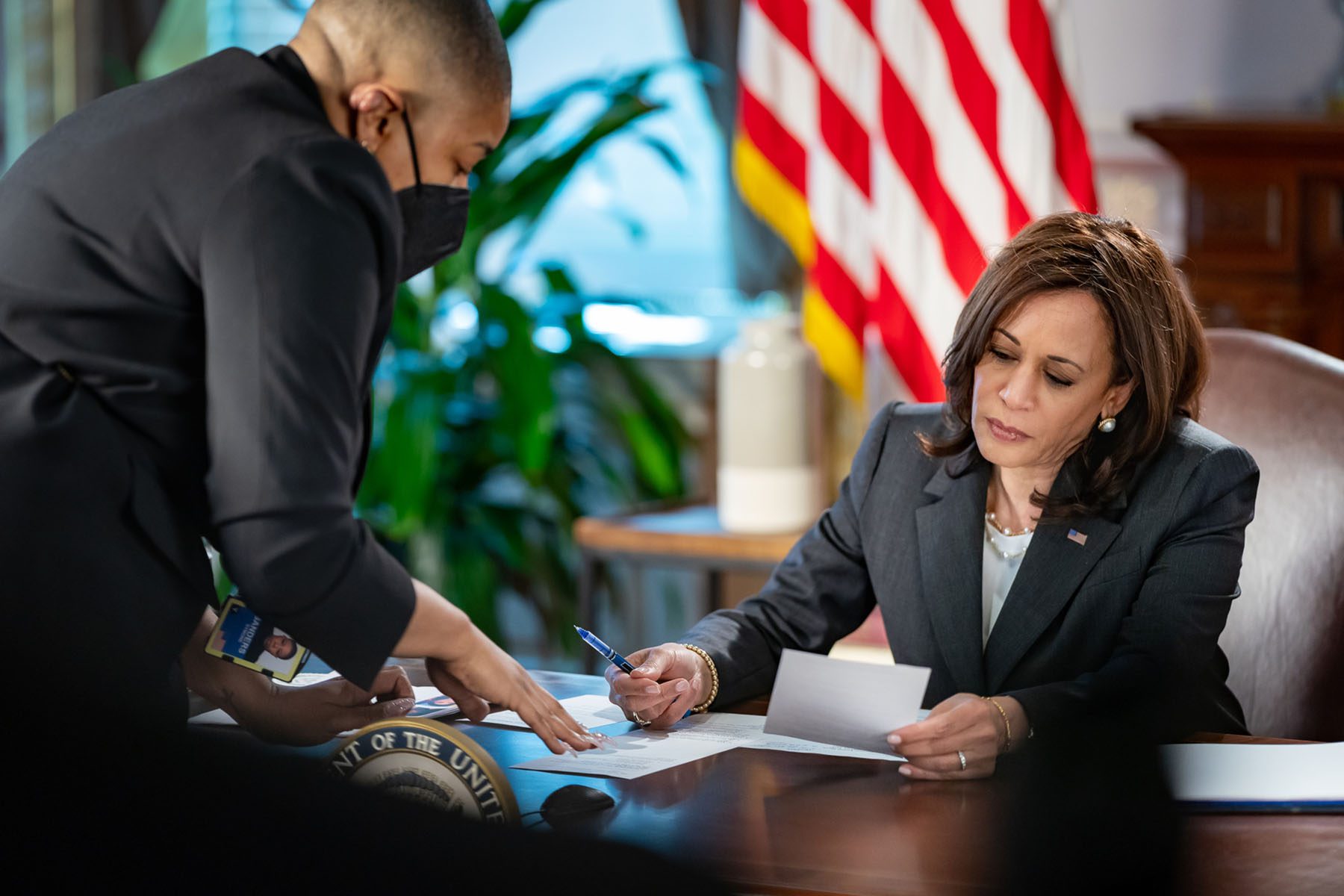
Harris and Biden embrace at the Democratic National Committee 2023 winter meeting in Philadelphia on Feb. 3. ANDREW CABALLERO-REYNOLDS/AFP via Getty Images
Could Biden Choose A New Running Mate In 2024?
Some Democrats say he should. Black women say he'd better not.
Originally published by The 19th
As President Joe Biden has signaled his intent to run for re-election in 2024, two narratives have consistently dogged him.
At 80, Biden is the oldest person to serve as president, and his age has been a cause for hand-wringing. This month, the White House doctor declared him “fit for duty” ahead of a campaign announcement that is expected to be imminent.
Also this month, a number of media outlets have reported ongoing concerns about Biden’s expected running mate, Vice President Kamala Harris, questioning whether she has proven herself capable of succeeding him. Harris’ detractors assert that she has failed to define herself in her historic role as the first woman to serve as the second-most powerful person in the country, and are openly musing about whether there are more politically viable Democrats who could potentially replace her on the ticket.
But headed into what is likely to be another close contest, regardless of his opponent, Biden will again need Black women to win — starting with the one by his side. Black women are the most loyal and consistent voting bloc for Democrats and were key to delivering victory to Biden and Harris, particularly in battleground states.
As I’m gearing up for another election season, when I talk to organizers and strategists and ask what they think the consequences of jettisoning the first Black woman to serve as vice president would be, the message is clear and consistent: It’s a non-starter.
“It would be political suicide for Democrats to remove the first African-American woman, a woman of color, from the presidential ticket,” said Democratic pollster Cornell Belcher. “They would basically hand the Republicans the White House. The base of the party would be demoralized.”
Karen Finney, a Democratic strategist who served as campaign spokeswoman for Hillary Clinton’s 2016 campaign, called the speculation “absurd.”
“He’s made it clear he’s running with her,” Finney said. “For those who are having those conversations, who do they think is more viable?”
Biden has pledged not only to run in 2024, but to run with Harris, whom he has called his governing partner and someone who “speaks for me.” He refers to their tenure as the “Biden-Harris” administration.
At this stage, incumbent administrations often endure chatter about whether the president should swap out his running mate, but the criticism around Harris began early and has persisted.
In many ways, the vice presidency is not a job built for the spotlight. A pandemic that kept the entire administration largely stuck in Washington for months didn’t help perceptions that neither Harris nor Biden were particularly visible at the beginning of their term. She was also tethered to the Senate, casting a record-breaking number of tie votes for Democrats.
In year two, Harris hit the road more, selling the president’s priorities with key constituencies, serving as a leading voice for the administration during the 2022 midterm elections on reproductive rights and meeting with leaders on the world stage. Still, her public schedule hasn’t always felt that way, as much of her work is either behind the scenes or covered far less than Biden’s daily activities.
“By virtue of the job, a lot of the work she does we don’t always see,” Finney said. “But we have faith in her, we see her, we believe in her, we know what she’s doing.”

Research from the Barbara Lee Family Foundation has explored the “imagination barrier” that assumes men running for office are qualified, while women have to work to prove themselves worthy of the job. One way to do that is by showing.
“We still live in an America that struggles with the changing face of leadership, what it looks like and how it leads,” said Glynda Carr, president and CEO of Higher Heights, which works to elect Black women. “As Americans in a democracy, we certainly should hold our elected officials accountable. In a 2023 America, where Black women’s leadership continues to rise to the highest levels, there is a fine line between criticism and asking women of color to be twice as good as their counterparts.”
Belcher, who has worked in Democratic politics for a generation, said that while the vice presidency is typically not a role that gets much attention, Harris’ tenure is drawing more scrutiny because of “overt gender bias overlaid with a smidgeon of racial bias.” And being a game changer has also meant that for her, the rules can sometimes seem different.
“I couldn’t tell you at any time in his four years as vice president where Mike Pence was,” Belcher said. “No one cared, no one asked. Even the current president, when he was vice president, no one said, ‘Why isn’t Joe Biden out in front of the president on a given issue?’ It’s not the job of the vice president to do that.”
Harris’ net approval rating is hovering at around 40 percent, essentially the same as Biden’s. And a recent poll showed 65 percent of Black voters approved of Harris, compared to 69 percent for Joe Biden, including nearly 80 percent of Black voters 50 and older.
I’d often hear from Black voters in the first year of the Biden-Harris administration that they wanted to see Harris more and were interested in what she was doing, no matter how mundane. The interest points to a “natural curiosity” people have about a trailblazer in a traditional role, Finney said.
“This White House needs to be more intentional about understanding that she is a historic first, which means it looks different and it is different,” Finney said of Harris. “There is unconscious bias that you have to address. … It can’t look the same as it did for the White men who were in that role.”
As the backbone of the Democratic electorate, Black voters are poised to factor prominently in the 2024 cycle — and Harris may again be tapped to not just shore up the top of the ticket, but as a surrogate in key races that could be won on the margins.
“President Biden understands that Black women and Black voters would not tolerate this conversation [about replacing Harris],” Finney said. “Part of the damage that this conversation is doing is it’s saying to Black women and Black voters that you don’t value what we bring to the table.”
Even growing speculation about replacing Harris would have “widespread consequences,” Carr said, noting that the administration has touted progress on issues from the economy to infrastructure that also impact Black voters.
“There’s something about replacing the vice president that would not sit well with Black voters, particularly Black women voters,” Carr said. “They’re going to call into question why there would be a change.”
Before and after his election, Biden has worked to prove his commitment to Black voters through his words and actions.
He has nominated a record number of Black women federal judges, including the first Black woman Supreme Court justice, Ketanji Brown Jackson. Biden has also called for police reform, urged Congress to pass voting rights legislation and called for an end to gun violence, all among the key priorities for the Black electorate. He pushed to change the Democratic presidential primary calendar to move South Carolina — the state that resurrected his primary campaign in 2020 on the strength of Black voters — to the front of the line.
When Biden chose Harris as his running mate in 2020, she pointed out “the audacity” of his pick, binding their fates and legacies. Harris is no less an asset headed into 2024, said Aimee Allison, founder of She the People, a voter engagement organization that focuses on women of color.
“We joined with women across the country to make sure we were represented in the White House, we voted in historic numbers. Looking ahead to 2024, those dynamics have not changed,” Allison said. “People should hold elected officials accountable, but this smacks of a kind of bias and opportunism to open space up for someone else. That’s unacceptable.”

Allison said the criticism is also a backlash to the political power Black women have gained in the last several years, as voters, organizers and leaders.
“Political power means being elected and being in leadership in places where we hadn’t been before,” Allison said. “It’s the goal of our organizing, figuring out how to defend the power we’ve built and build on the power we have. We’re not giving an inch; we’re continuing to push, and we’re fighting on multiple fronts.”
How Harris will be greeted on the ground versus how perceptions of her continue to evolve could have implications for the party next year and beyond.






